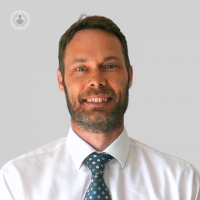Frozen shoulder: how long can it last?
Written in association with:Pain and stiffness in the shoulders could indicate frozen shoulder, a common condition that can limit the movement of the shoulder. Mr Daniel Neen, leading consultant trauma and orthopaedic surgeon in Kent, explains how long can a frozen shoulder last and when surgery is required.

What is frozen shoulder?
Frozen shoulder, otherwise known as adhesive capsulitis or a stiff shoulder, is a form of inflammation that affects shoulders in particular and that produces a combination of pain and restriction of movement.
What are the main symptoms and causes?
The main symptoms are of pain initially and then, gradually, the shoulder will stiffen up. There are three main stages of frozen shoulder, that we describe as freezing, frozen and thawing. Each stage can last somewhere between three and nine months and the whole process can go on for two or more years.
Causes can be out of the blue or a minor trauma that you wouldn’t even pay attention to. However, it can also be an underlying issue such as diabetes or thyroid issues, that can bring about the problem.
How can it be prevented?
Unfortunately, some of the issues cannot be prevented, such as the minor trauma or the causes that are out of the blue for no particular reason. Closer control of your diabetes and thyroid disease can help minimise the chances, but again, it’s not necessarily going to prevent frozen shoulder altogether.
Is surgery required?
Surgery is definitely not required all of the time. The safest thing to do is to do nothing at all and sit and watch and wait, but unfortunately, the long process and the degree of pain that can be brought about because of the shoulder pain, is not necessarily an option for a lot of people. So, there are other options that we try.
In the initial stages, we know that certain interventions, such as physiotherapy, can actually make things worse, so steroid injections into the shoulder are used, which can help to calm down the inflammation. It may not prevent the stiffness and it may not get rid of all the pain altogether, but usually, it certainly helps matters.
Once the patient is in the second stage - or the frozen stage - more options are definitely available. These include: physiotherapy; steroid injections with a bit of extra fluid that we call hydrodistension or hydro dilatation; surgical interventions such as manipulation under anaesthesia, which involves a very short general anaesthesia and a manipulation of the shoulder back to full range of movement; or an arthroscopic arthrolysis, which involves a slightly longer general anaesthetic, but a release of all the constricted tissues under direct vision using keyhole surgery.
What can happen if left untreated?
Untreated, the condition normally resolves itself slowly with time, but it can take a couple of years or more. There was one recent article suggesting that some niggles (as they were described) can go on for many years beyond.
If you’re experiencing symptoms of frozen shoulder and would like to seek expert treatment, don’t hesitate to visit Mr Neen’s Top Doctors profile today.


